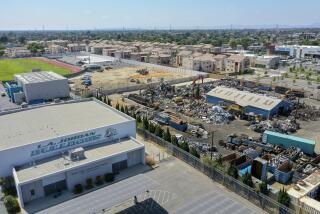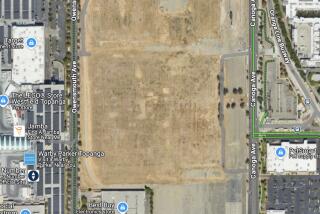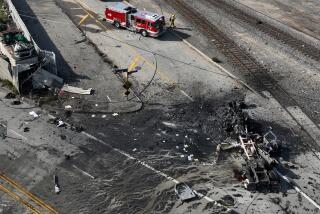3 Scientists Indicted in Fatal Blast at Field Lab
- Share via
Three scientists involved in a 1994 rocket fuel explosion that killed two workers at Rocketdyne’s Santa Susana Field Laboratory were indicted by a federal grand jury Wednesday on four counts of violating U.S. environmental laws, the U.S. attorney’s office said.
The men were charged with illegally storing and burning explosive waste, which led to the fatal blast at the lab near Simi Valley, federal officials charge.
The scientists were all employed by Rockwell International Corp.’s Rocketdyne Division, which was sold in 1996 to Seattle-based Boeing Co.
Among those charged in the Los Angeles grand jury indictment is Joseph E. Flanagan, 58, a former director of Rocketdyne’s chemical technology group. Also charged are James F. Weber, 49, of Moorpark and Edgar R. Wilson, 62, of Simi Valley, who are still employed by Rocketdyne. Now retired, Flanagan lives in Stanwood, Wash.
The indictment alleges the violations occurred over a 2 1/2-month period in 1994 at the lab, where rocket engine tests are regularly performed. Federal prosecutors said the violations led to the July 26, 1994, blast that killed company physicists Otto Heiney and Larry A. Pugh.
If convicted, each defendant faces a maximum penalty of five years in federal prison and a fine of up to $250,000.
“Corporations can only act through their individual employees,” said Assistant U.S. Atty. Joseph Johns, one of two prosecutors handling the case. “So it is the rule rather than exception for us to identify and prosecute the individuals responsible for such criminal activity.”
Boeing has not been accused of wrongdoing in the case.
Critics of the company had mixed feelings about the indictments, saying they were happy that individuals are being held accountable, but that they didn’t go far enough.
“I think that if the U.S. attorney had been serious about this issue we would have seen the head of Rocketdyne named at the top of that list,” said Dan Hirsch, co-chairman of an independent committee overseeing health studies and pollution cleanup at the lab. “What these indictments are saying is that these guys were the ones responsible and that no one else in the company knew of how these things were being disposed of . . . I don’t believe that’s the case at all.”
Barbara Johnson, a Rocketdyne neighbor and one of the committee’s community representatives, said she felt similarly.
“Somebody’s being held responsible and that’s good, but it’s the wrong people,” she said. “A strong message needs to be sent to Rocketdyne and companies like that that they cannot break the law. . . . As it is, they get off too easy.”
But authorities later concluded that the scientific research cited by company officials was a cover for criminal actions, including illegal destruction of explosive wastes.
In 1996, Rockwell pleaded guilty in federal court to three felony counts of mishandling hazardous chemicals and agreed to pay the U.S. government $6.5 million in fines for the 1994 explosion.
The plea agreement granted Rockwell immunity from federal charges of illegal handling, disposal, storage or transportation of hazardous waste that occurred since 1991. The immunity deal with Rockwell did not shield individual employees from prosecution, paving the way for the indictments handed down Wednesday.
Lawyers for the defendants accused the government of trying to find scapegoats for a tragic accident.
“After dragging its feet for nearly five years, the government compounded the trauma by indicting the co-workers and friends of the two men who died while conducting the experiments,” said a statement issued by Weber’s defense attorneys, James R. Asperger and Mark Holscher. “Like the other defense lawyers in the case, we intend to vindicate our client.”
Attorneys for the other defendants also said their clients were not guilty.
Rocketdyne spokesman Dan Beck said Wednesday the company would reserve judgment until the case was heard in federal court.
“Now is not the time to speculate on the merits of the government’s case,” Beck said. “Since the accident we’ve taken a number of actions to increase safety for our employees.”
More to Read
Sign up for Essential California
The most important California stories and recommendations in your inbox every morning.
You may occasionally receive promotional content from the Los Angeles Times.










